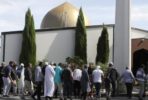DRESDEN (Germany) — The fear of foreigners, especially Muslims, threatening or drowning out national and regional identities forged over centuries seems to have a growing pull in Europe, where populists and nationalists scored record gains in elections in May for the European Parliament and where recent protests against immigrants flared up in Germany and Sweden.
The simmering resentment and suspicion have driven debates across Europe about tighter controls on immigration. Worries about immigration have helped buoy right-wing parties in Britain, Denmark, France and Hungary. German officials recorded more than 70 attacks on mosques from 2012 to 2014, including a case of arson, and the police in Britain have recorded an increase in hate crimes against Muslims.
Protesters marched in several German cities on Monday against higher levels of immigration and what they see as the growing influence of Islam, in defiance of an appeal from Chancellor Angela Merkel to spurn rallies she views as racist.
The German rallies, organised by a new grassroots movement known as PEGIDA, or Patriotic Europeans Against the Islamisation of the West, have become an almost weekly event in the east German city of Dresden in recent months. About 18,000 people, the biggest number so far, turned out in Dresden on Monday, but similar rallies in Berlin and the western city of Cologne were heavily outnumbered by counter-protesters who accuse PEGIDA of fanning racism and intolerance.
In her New Year address last week, Ms Merkel urged Germans to shun the anti-Muslim protesters, saying their hearts were full of hatred. “We need to … say that right-wing extremism, hostility towards foreigners and anti-Semitism should not be allowed any place in our society,” she said on Monday in the eastern town of Neustrelitz.
Ms Merkel was joined in her sentiment yesterday when top-selling German tabloid Bild and 50 prominent Germans called for an end to what they see as rising xenophobia. Bild published a “No to PEGIDA” appeal yesterday, covering the front page and a double page spread on pages 2 and 3 with quotes from the 50 politicians and celebrities.
“(They) are saying ‘no’ to xenophobia and ‘yes’ to diversity and tolerance,” Bild deputy editor Bela Anda wrote in a commentary. “We should not hand over our streets to hollow rallying cries.”
Elsewhere, hundreds of Swedes gathered last Friday outside the royal palace in Stockholm and in other cities to show solidarity with the Muslim population a day after an unknown assailant threw a bottle filled with flammable liquid at a mosque in the northern city of Uppsala and sprayed racist slogans on the building. The firebomb caused no injuries and did not damage the building.
But as each day brings more reports of immigrants who have boarded ships and sneaked across European borders, the famous tolerance of the Swedes is being tested as never before.
Despite a lacklustre economy, Sweden was third behind only Germany and France in the number of people registering for asylum in 2012, said the Migration Policy Institute in Washington. Relative to its population, Sweden received the second-highest share of asylum applications in the European Union after Malta, the institute said.
Even so, there are few places where the turn against immigrants is more surprising than Sweden, where a solid core of citizens still supports the 65-year-old open-door policy towards immigrants facing hardship that has long earned international respect for the country.
The Syrian conflict has boosted the number of asylum seekers. Of 81,000 people seeking asylum in Sweden in 2014, roughly half were from Syria, the Swedish Migration Board said.
Opposition to the rising numbers is growing. The far-right, anti-immigrant Sweden Democrats had their best showing ever, nearly 13 per cent of votes, in elections in September.
Mr Omar Mustafa, president of the Islamic Association of Sweden, which represents about 40 communities across the country, said the recent fires at mosques were the culmination of a year of rising anti-Islamic attacks, from women having their hijabs, or head coverings, pulled off in the streets to the vandalism of 14 mosques, as well as racist or anti-Muslim vitriol spread through social media.
“It is a scary development in Swedish society,” Mr Mustafa said in a telephone interview. “It is a big movement that is moving from the Internet to the real world.”
Germany, too, has some of the world’s most liberal asylum rules, partly due to its Nazi past. The number of asylum seekers arriving in Germany, many from the Middle East, jumped to around 200,000 last year, four times as many as in 2012. In Cologne, home to a large Muslim population, there were 10 times as many counter-demonstrators as PEGIDA protesters. In similarly multi-ethnic Berlin, about 5,000 counter-demonstrators swamped around 400 anti-Muslim protesters, local police said.
“Germany is a country where refugees are welcome and the silent majority must not remain silent but rather go out onto the streets and show itself,” Justice Minister Heiko Maas said at the Berlin counter-demonstration.
Cologne Cathedral, one of Germany’s most famous landmarks, switched its lights off to protest against the anti-Muslim rallies. Berlin’s Brandenburg Gate turned off its floodlights in a similar gesture of solidarity.
Source: www.todayonline.com







